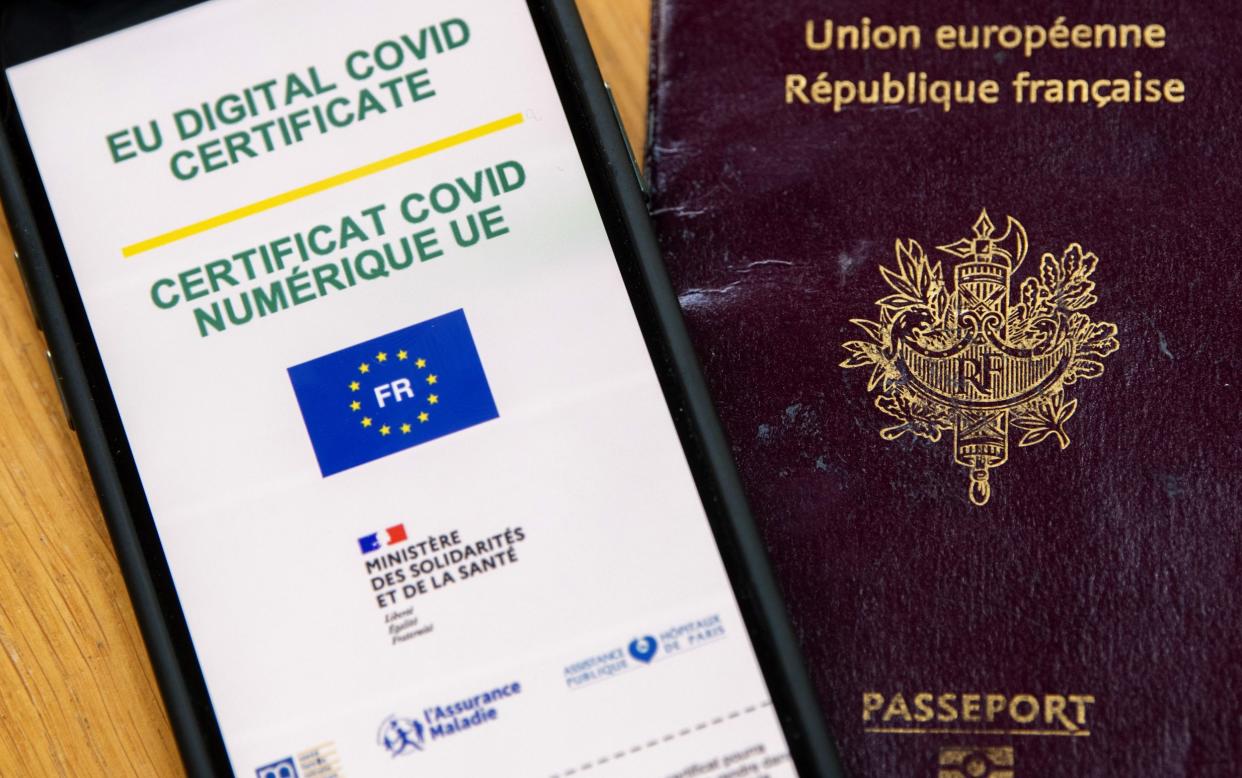UK on brink of joining EU Covid vaccine passport scheme

Britain is on the verge of joining the EU Covid vaccine passport scheme, sources in Brussels and Westminster have confirmed.
The EU Digital Covid Certificate should make travelling in Europe easier and cheaper for British tourists. Joining it would also enable the Government to quickly launch a domestic vaccine passport system.
Last week, when outlining his autumn and winter plan, Boris Johnson said domestic vaccine passports could be used as part of a "plan B" should Covid start to stretch NHS capacity again.
The Telegraph has been told by the EU that integration of the UK's vaccine database into the EU system is at an advanced stage.
"Significant progress was made on a technical front, namely when it comes to the connection to the gateway, with aim of going live [testing] soon," said a spokesman for the European Commission.
The UK Foreign Office and Department of Health and Social Care (DHSC) have joint responsibility for the project in the UK. They formally applied to join the EU scheme on July 28, and technical work has been carrying on behind the scenes ever since.
Officials at the DHSC and the Foreign Office confirmed work was progressing. The DHSC was dealing with "epidemiological aspects" and the Foreign Office with "EU relations", said a Foreign Office spokesman. The Cabinet Office was also involved.
The EU Digital Covid Certificate is the biggest vaccine passport scheme in the world and covers more than 40 countries, including all 27 EU states and others as far afield as Israel and Panama.
The system is effectively a giant digital platform or "gateway" through which different countries' vaccine certificates and test results can be scanned and verified as legitimate. It is not a test and trace app and is used on all external EU borders and also for domestic vaccine passports schemes operating in countries including France, Holland and Portugal.
Border guards, as well as restaurant, bar and nightclub owners, simply download an app that can read the QR code on an individual's vaccine certificate or negative test result.
Joining the EU scheme should ease travel to and within continental Europe. For example, double jabbed Britons travelling to Portugal must currently buy a lateral flow test before departure, at £20 to £40 a time, only because their jabs are not recognised by the EUDCC.
This will change for Portugal and other countries once the UK joins the federalised EU system. Joining it will also make accessing restaurants, bars and events easier in countries that operate domestic Covid passport schemes such as France, Italy, Portugal, Germany and Holland.
Paul Charles, the chief executive of travel consultancy The PC Agency, said the use of the EU's digital certificate for entry to restaurants, bars and other venues in France had proved popular with the public.
"More people have got vaccinated as a result and the French have seen their infection rates drop significantly because of this measure. I think the UK public will get more and more used to it and you are likely to see it being integrated into daily life," he said.
"This is not for the short term. Governments are getting used to it. They see it as increasing vaccine uptake, and they will be reluctant to remove it for people who are fully jabbed."
However, some fear the use of such a scheme, which allows governments and others to restrict an individual's access to events and places based on their health record, could create "a two-tier Britain". It has also been seen as laying the groundwork for national identity cards.
The EU scheme, governed by the European Commission and Parliament, only has an initial licence to run for 12 months from July 1 and has strict rules regarding data privacy.
The personal data passed between databases when an individual's QR code is scanned is "limited to what is necessary" to provide the certification requested, the EU has said.
"The EU Digital Covid Certificate uses a decentralised system, which does not require a central EU database or the exchange of personal data among authorities," it added. "In addition, the data accessed for verifications must not be kept by the verifier following the check (e.g. when boarding a flight)."

 Yahoo News
Yahoo News 
